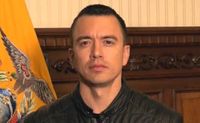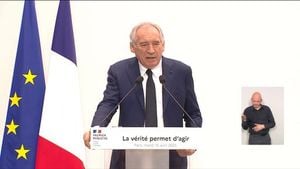In a surprising turn of events, President Daniel Noboa has secured re-election in Ecuador, garnering 55.88% of the votes in the second round of presidential elections held on April 13, 2025. His opponent, leftist Luisa González, received 44.12%, according to the National Electoral Council (CNE). The election saw a voter turnout of over 83.7% of the 13.7 million Ecuadorians eligible to vote, reflecting a robust engagement in the democratic process.
Despite the clear results, González has refused to acknowledge the outcome, alleging electoral fraud and demanding a recount. "We do not recognize the results presented by the CNE," she stated, surrounded by supporters in Quito who chanted accusations of fraud. Former President Rafael Correa, who leads the movement that González represents, echoed her sentiments, claiming that the results were impossible and calling the election a farce on social media.
The electoral results have stirred significant tension in the political landscape of Ecuador. Noboa, a 37-year-old business heir who has been in office for just over 16 months, previously won a temporary mandate in 2023 after defeating González. His re-election marks a pivotal moment in Ecuador's political history, particularly as it represents the third consecutive failure of Correa's party to regain power.
In his victory speech, Noboa emphasized the need for change, stating, "Ecuador wants to be different; it does not want to return to the past but to move forward." He has promised a transparent government that will ensure a better future for the country's children. His administration's focus on security and economic recovery has resonated with many voters, particularly in light of the rising violence and economic challenges the country faces.
During his campaign, Noboa highlighted his 'Phoenix' security plan, which includes military mobilizations in the streets, enhanced port security, and increased drug and weapon seizures. He reported a 15% reduction in violent deaths last year, a notable achievement amid rising crime rates associated with local gangs and international cartels. However, the murder rate in Ecuador remains alarmingly high, with 38 per 100,000 inhabitants, making it the most violent country in Latin America.
González, who voted in the coastal province of Manabi, promised to reinstate social programs initiated by Correa during his presidency from 2007 to 2017 and to bolster security. She criticized Noboa's governance as improvised and ineffective, pointing to the annual increase in murders as evidence of ongoing insecurity. Her campaign also focused on mobilizing 20,000 new police officers to combat crime.
As the political climate grows tense, Noboa's administration has faced criticism for declaring a state of emergency just before the elections, which included restrictions on gatherings and the right to domicile inviolability. Critics argue that these measures were designed to stifle potential protests against the electoral results.
In the lead-up to the election, Noboa capitalized on the public's discontent with Correa's legacy, particularly as the former president has been living in exile in Belgium after being sentenced to eight years in prison for corruption in 2020. The anti-Correa sentiment has been a significant factor in Noboa's appeal, as he positions himself as a candidate for change.
With the second-round results showing a wider margin than anticipated, Noboa's victory indicates a shift in public sentiment. The first round of voting in February had been much closer, with Noboa leading González by just 0.17 percentage points. Polls leading up to the second round suggested a technical tie, making the current results even more striking.
The CNE's president, Diana Atamaint, defended the integrity of the election process, stating that the results reflect the clear will of the people and reaffirming the commitment to democracy. "Democracy is strengthened when the voice of the people is respected, and today that voice was heard clearly," she declared.
Looking ahead, the new administration will face significant challenges, including addressing the ongoing violence and economic crisis exacerbated by the pandemic. The country has entered a recession, and Noboa's government will need to devise solutions for the energy crisis, which has led to frequent blackouts due to drought conditions affecting hydroelectric power generation.
The violence and insecurity have become central themes for the Ecuadorian populace, impacting the economy and forcing many to emigrate. Despite a reported 16% reduction in homicides last year, the rising crime rates continue to pose a threat to Noboa's presidency, particularly in urban areas like Guayaquil, which has become a focal point for criminal activity.
As Noboa prepares to assume a full four-year term, the political landscape remains fraught with divisions. The next critical date will be April 15, when the European Union's observation mission is expected to release its preliminary report on the election, which could further influence public perception of the legitimacy of the results.
In a nation grappling with its identity and direction, the re-election of Daniel Noboa marks a significant chapter in Ecuador's political saga. The coming months will be crucial as he navigates the complexities of governance in a divided country, all while addressing the pressing issues of violence and economic recovery that have plagued Ecuador for years.








